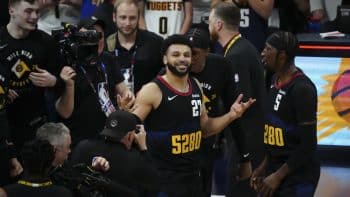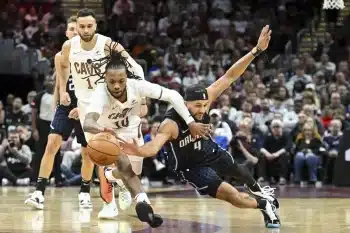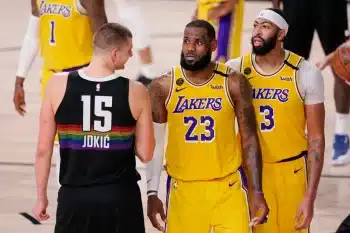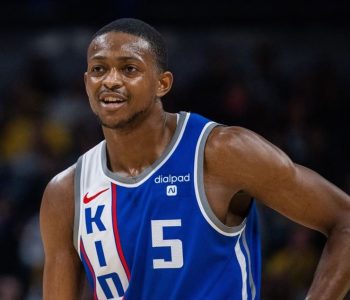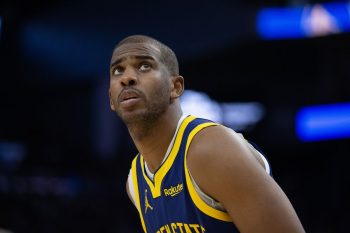NBA
NBA Daily: Fixing The Washington Wizards

Basketball Insiders’ “Fixing” series has been going on for a few weeks. We’ve started with the teams that hovered around the bottom of the league this season and are now transitioning to teams that stayed in the playoff hunt through the duration of the season. Today’s team: the Washington Wizards.
Much has been made about the well-documented frenzy surrounding both the Celtics and the Lakers, but if there was one team who had the season from hell, it was the professional basketball team located at the nation’s capital.
Where to begin with what went wrong for the Wizards? Hardly any of their offseason additions worked out. They traded away cheap young talent for overpaid roster filler. Their star player’s season ended prematurely and will now miss next season entirely. It only took two years for the Wizards look like a complete shell of the team that was inches away from the conference finals.
Basically, you know things have gone horribly wrong when adding Dwight Howard had nothing to do with why you have become a disaster.
What Is Working
The Wizards still managing to get 30+ wins in the absence of John Wall is all pretty much thanks to Bradley Beal’s evolution. After DeMar DeRozan headed west and Victor Oladipo went down, Beal was hands-down the best shooting guard in the eastern conference and arguably the entire league.
With John Wall down for the count, Beal had to step up his game, and he did just that. After Wall opted for season-ending heel surgery, Beal played the best basketball of his career, averaging 27.4 points on 47.5 percent shooting from the field and 35 percent shooting from three. Beal also showed evolved playmaking, as he dished out 6.1 assists per game while only coughing up 1.8 turnovers per game.
After seeing his name in trade rumors, and having to deal with tension in the locker room, Beal managed to work through it all to put up his best season as a pro at 25. His play is what kept the Wizards from going into a complete tailspin. He should get the majority of the credit, but not all of it.
As odd as it sounds, the Wizards’ players who were on economical contracts gave the team a boost by exceeding expectation.
Jeff Green was actually quite a brilliant addition having had his best season since 2015. He averaged 12.3 points on 47.7/35.6/89.4 splits. Green, who has usually shown himself to be a net negative on the court throughout his career, and his efforts actually proved to help Washington, as the Wizards were plus-1.5 with him on the court.
Thomas Bryant was too. Filling in for Dwight, Bryant did an exceptional job as the starting center. Putting up 10.5 points and 6.3 rebounds per game, while shooting 61.2 percent from the field, put Bryant’s name on the map, and is another example of the Lakers letting young talent slip through the cracks although to a lesser extent.
Tomas Satoransky continued to be a serviceable jack of all trades wing, and even Sam Dekker did okay for a guy that was acquired for deadweight. Going off the record, it’s not like they were life-savers – but they did enough that Beal wasn’t single-handedly responsible for how the Wizards turned out.
Even if the season didn’t go nearly as well as the Wizards would have hoped, Beal’s superstar-like play combined with the efforts of the lowly-paid guys put them a notch above terrible.
Whether that’s a good thing is debatable.
What Needs To Change
It’s funny how the Wizards already made the one change that many have begged them to make for years now. Just this past week, Washington cut ties with general manager Ernie Grunfeld after a long history of some rather questionable decisions.
Besides that, the Wizards really have to ask themselves where they should go from here. Scott Brooks has not done a good job captaining the ship since his first season. John Wall won’t be coming back until the fall of the new decade. Plus who knows if he’ll ever be the same player following two very serious injuries consecutively. Most pressing of all, Bradley Beal’s expiring contract next season really puts Washington at a crossroads.
It really depends on what direction new management wants because it could honestly go either way. Do they cut their losses with Beal this summer and trade him for the most value they can, or do they ride it out, bank on getting him an extension, and then see what to do?
A team that wins between 30 and 35 is one that’s really in no man’s land. It’s not quite good enough to qualify for the playoffs – even in the East – and yet not bad enough to help one’s odds of getting a franchise player in the draft. Staying in that state is not going to help anyone. Having cap room thanks to the Otto Porter trade should help them, but Wall’s prolonged absence and uncertain future put a dark cloud over the franchise.
This summer should speak volumes about where they want to go. Nobody would fault them for going after win-now stars just as nobody would fault them for trading their best players for young assets.
So to summarize, what needs to change is the Wizards need to go over what’s gone wrong for them in the last two years and then determine what is the best avenue to take from here on out.. They should keep in mind that no matter where they go, they are eating John Wall’s new expensive contract whole.
Focus Area: Free Agency
After trading Otto Porter and his $28+ million contract, the Wizards will probably have some breathing room cap-wise this summer. What they do with it is entirely up to them. Only Wall, Beal, Ian Mahinmi and Troy Brown Jr. are committed past this season alone so there are some decisions to be made.
How much money the team will have depends on what they do with Jabari Parker. Jabari actually wasn’t that bad in his short stint in DC. 15 points per game on 52/30/68 splits is solid. And the Wizards were plus-7 with him on the court. That’s good. That’s just not good enough to justify paying him $20 million.
It’s much likelier that the Wizards won’t pick up his team option. That does not mean the team won’t try to keep Parker, who’s only 24, at a reduced price.
Bobby Portis is also someone potentially worth keeping around. He also proved to be a reliable contributor for the Wizards. His 14.5 points per game on 44/40/79 splits as well as 8.6 rebounds per night are exquisite for a guy on a rookie contract. He also wasn’t too far behind Parker in overall impact on the floor, as the Wizards were plus-4.9 when Portis was on the court.
Since he’s a restricted free agent, Washington will have the edge on any interested suitors this summer. If they are able to keep Portis on a team-friendly deal, then that’s a win for them.
There are other free agents Washington will have to ponder keeping around. Particularly their wings. Much has been talked about Jeff Green, Tomas Satoransky and Sam Dekker. They could keep any of the three of them if they wanted to. It just all depends on what management thinks is the best road ahead.
The same applies to Trevor Ariza. The Wizards overpaid to trade for him, but he did his best. In fact, while his 40 percent shooting and 32 percent three-point shooting weren’t too great, his 14.1 points per game average was the highest he’s put up since his last season in his first tenure with the club.
It’s just a shame that all of their efforts had to go to waste. They could stay if Washington wanted them. If they want their efforts to mean something however, it may be in their best interests to go elsewhere.
There are other guys who will be on the market who aren’t as vital. Dwight Howard did next to nothing this season. So, given that he has a player option, he’s probably going to opt in. In fact, him opting in will probably impact Thomas Bryant’s potential return.
There is a solid chance that the Wizards come back next season with an entirely different roster. It will be interesting to see if the hypothetical roster is designed to win now, later, or both.
Focus Area: Draft
So much could go right and wrong for the Wizards. It all depends on how they do against the one team that ruined them in 2017. Washington will face off against Boston for its last game of the season. Believe it or not, there are a lot of implications from this one game.
Washington currently has a half-game lead over Memphis and Dallas for the sixth lowest-record in the league. It owns the tiebreaker (as far as highest draft position goes). If the Wizards lose to the Celtics, that will help them keep the sixth-highest odds to get the first overall pick. If they win, that could drop them all the way to ninth if Memphis, Dallas and New Orleans all lose.
In the Wizards’ case, they should probably throw this next game away because getting a higher lottery pick after all that’s blown up in their face provides them with a light at the end of the tunnel. This draft is pretty top-heavy, so a nine percent chance at the first overall pick isn’t too exciting. Getting a pick somewhere in the six-to-eight range is not much better. Still though, with everything that’s gone wrong, getting some form of young talent can make such an underwhelming season feel somewhat worth it.
Washington could also very well package where their pick lands along with Ian Mahinmi’s suddenly expiring contract for someone useful to boost their playoff chances if they do in fact believe Wall will be back to normal when he returns.
In case it hasn’t been clear, there’s no clear answer for how to fix the Washington Wizards. If they try to win now, they have limited options to get back to where they were two years ago, let alone become a contender. If they rebuild, they have John Wall’s mammoth contract extension about to take effect which would prevent them from being as flexible salary-wise as rebuilding teams would like.
If that’s not a Catch-22 at its finest, then this writer doesn’t know what is.
